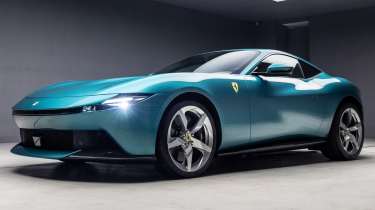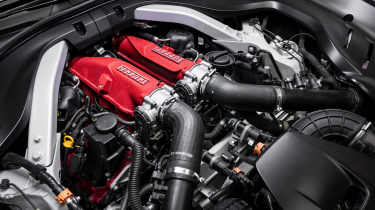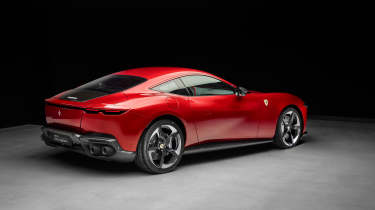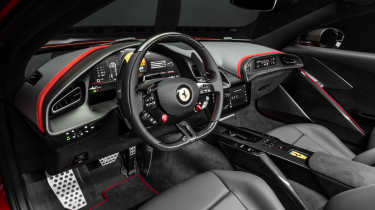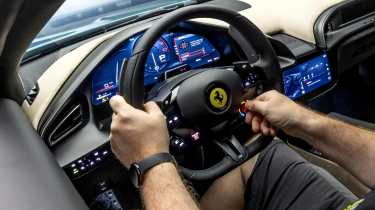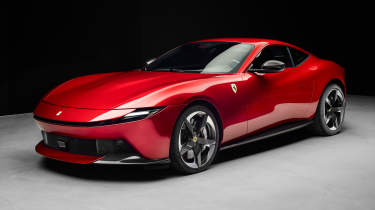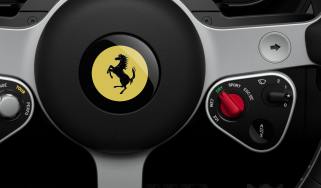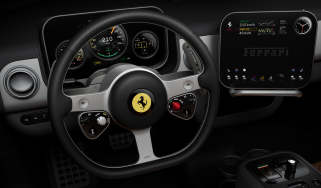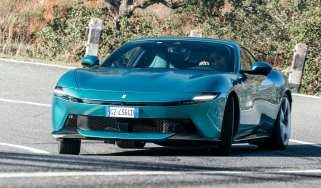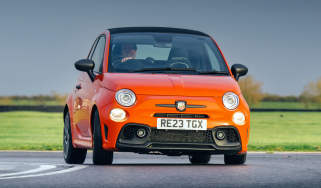New 2026 Ferrari Amalfi revealed – physical buttons return in the 631bhp Roma replacement
The Ferrari Amalfi picks up where the Roma left off, as a more capable, debugged super GT that’s finally brought back buttons
There is a case to be made for the claim that the new Ferrari Amalfi (like the Roma that it replaces) is the most important car in Ferrari’s range. Why? Because it, like the cars in its lineage going back to the original California, is responsible for bringing new customers to the brand. And so they have, with great success, even up to the Roma’s five-year tenure, over which 50 per cent of the units sold were someone’s first Ferrari.
This strand of the Ferrari family tree has in the past struggled with its identity, however – the original California was heavily criticised for its floppy dynamics with many claiming it wasn’t a proper Ferrari. The mission ever since from the California T, through the Portofino and into the Ferrari Roma, has been to hone what Maranello doesn’t enjoy being called an ‘entry level model’, into a proper Ferrari.
In the Roma, we’d argue it succeeded. Here was a sport’s GT that expertly blended trace amounts of inimitable Ferrari supercar freneticism with genuine comfort and refinement. It’s exotic to look at, yet elegant in its detailing and proportions. It was exciting to drive with enthusiasm and competence at speed, but still compliant and cossetting across great distances.
In short, in the Roma Ferrari nailed it, so the margin for improvement in its replacement is surely quite slim? Potentially not, given the assortment of niggles and irritants that mire an otherwise stellar car. The Amalfi, then? Think of it as the Roma debugged, with its kinks ironed out and its strengths built upon further. Let’s get into the details.
Ferrari Amalfi – powertrain and tech
It won’t have taken long to surmise that the Amalfi is a closely-related development of the Roma, with the old car’s same basic structure hardpoints and dimensions carrying over, even if all the bodywork and most of the glasshouse is new. The same is the case for the engine and transmission, albeit with notable revisions.
Firstly the engine. The modest jump from 611bhp to 631bhp doesn’t really do the changes justice, nor the modest 0-62mph time improvement, down 0.1sec to 3.3sec, nor the unchanged 560lb ft torque figure. The fact that this power arrives as late as 7500rpm is more of a clue as to how the front-mid-mounted 3.9-litre twin-turbo V8 has evolved. It’s all about character. Ferrari has lightened the cam shafts by 1.3kg and increased the maximum turbine speed in the turbochargers by 6000rpm to 171,000rpm. Using the new ECU from the 296 GTB, 12 Cilindri and Purosangue, the turbochargers can now be independently controlled, with overall control of the engine now more precise and efficient.
As a result of all these changes, Ferrari claims the updated engine is now more responsive and faster to rev, with a redline of 7600rpm. This additional responsiveness is paired with what’s claimed to be a better sound combining efforts to tune the intake and exhaust (with a new proportionally controlled bypass valve with dedicated maps) with strategic tubing between the engine bay and cabin, to make the Amalfi’s a more exciting and characterful derivation of the familiar F154 V8. The eight-speed dual-clutch transmission carries over as well, albeit with revisions to its calibration to improve performance in the first seven gears, especially in third and fourth, while making eighth more refined. Hybridisation was not seen as the correct solution for the Amalfi for the time being.
This broadening of capability, making it more exciting but also more refined carries on throughout the rest of the car. Each of the Manettino settings have been broadened in their scope – the Amalfi should be more sporting in Sport, Race and ESC off, and more broadly capable and comfortable in the Comfort and Wet settings. Much to this end is the installation of the ABS Evo brake-by-wire system first seen on the 296 GTB and featured in the Purosangue and 12 Cilindri, using the 6D sensor and its millisecond-ly readings to optimise braking force for each wheel based on slip. Then there’s Side Slip Control 6.1, which ties it all together to make the Amalfi what should be a more competent and predictable, yet more fun car at the limit in all conditions.
> The Ferrari 296 Speciale could be the most thrilling Ferrari ever
Also playing into the car’s dynamic character is the aerodynamics. New underfloor strakes improve high-speed stability and a revised diffuser improve downforce versus drag. A new active rear wing now spans the rear end, rather than bookending the back window. Rising at 56mph to improve high-speed stability, it stays in this mid position until past 186mph before retracting to reduce drag. It can assume a third high position during high-speed dynamic driving, adding 110kg of downforce at 155mph.
The weight is more or less unchanged – 1470kg (dry), the savings from the lighter cams and an engine block that's lost 1kg cancelled out in other areas. The Amalfi features 20-inch wheels front and rear, shod in either Bridgestone Potenza Sport or Pirelli P-Zero rubber. All told the Amalfi should be a more exciting, more dynamic driver’s car than the Roma it replaces.
Ferrari Amalfi – interior and design
Speaking of the design, let’s take a look. The Roma was all about elegance and subtlety and that continues with the Amalfi, though it’s perhaps not as bold or innovative as the car it replaces. Inside and out, the Amalfi is a rationalisation of what came before based on what it’s sold alongside. There are hints of Purosangue at the front, especially in that thin panel between the lights that contains the numerous ADAS system hardware.
> Best Ferraris – evo’s favourite road cars from Maranello
The hump in the bonnet is less pronounced, the cheesegrater grille has been dispensed with as has that subtle scalloping of the Roma’s rump in which the lights were mounted. It’s still highly elegant and less divisive than the 12 Cilindri, if perhaps lacking some of the Roma’s distinction and beauty.
The interior is an area of enormous change for the Amalfi, with the big headline being a return to buttons. Yes, the Amalfi gets the steering wheel with physical buttons we first saw in the F80 and then the 296 Speciale.
On top of that though, we now see a return to a physical, tactile start/stop button for the engine in anodised red to match the revised Manettino. The change is a direct result of comments from customers, who wanted the event of firing up their Ferrari to feel less like ‘using an iPhone’.
The overall return to buttons is in acquiescence to both customer demands and Ferrari’s ‘eyes on the road, hands on the wheel’ mantra, which the old concentration-sapping haptic system certainly didn’t help towards. The ADAS system is also simpler to turn off – one button on the wheel takes two pushes, and you’re free of the nagging.
The Roma’s vertical screen and hemmed-in cockpit feel are gone too, with a new more conventional horizontal screen and open layout taking its place. While the amount of actual space is the same in the Amalfi as the Roma, the new car is claimed to feel more spacious from the inside. A binnacle sits ahead of the passenger with two vents, flanking the almost ubiquitous passenger display. A point worth noting, we sat in a few Amalfis, some with generic trim and some with a carbon upgrade. The generic plastic cladding of that binnacle around the air vents did not have a quality feel you might associate with a £200k super coupe. Carbon upgrade incentive, much?
2026 Ferrari Amalfi price and availability
That brings us to the price. UK pricing is as yet unannounced but the first cars delivered in Italy in Q1 2026 will start from €240,000, or £206,227 at today’s exchange rate. UK cars will follow in the second quarter of 2026. You’ll be able to see the new Ferrari Amalfi in person on Ferrari’s new stand at the 2025 Goodwood Festival of Speed.
As for the Spider? It’s almost certain to follow in shorter order than the three-year wait between Roma Coupe and Spider. Why they haven’t arrived together, as the 12 Cilindri and Spider did, is unknown. More exciting is the prospect of a hotter form of Amalfi that could be on the cards. Ferrari officials have outright dismissed the prospect in the past, when asked about such a model to be based on the Roma or Portofino. This time? When we asked Ferrari’s Chief Product Development Officer, Gianmaria Fulgenzi, he simply said ‘I cannot speak about this’, with a knowing smirk. Amalfi Assetto Fiorano anyone?
So, the Amalfi. It’s not a totally new car as the new name would suggest. Ferrari claims the work that’s gone into it would be undersold by calling it the Roma M. I’d also hazard to suggest that a new name rather than a new version of an existing car, is easier to market.
Either way, a debugged version of what was already a great car sounds like trouble for the Aston Martin DB12, Bentley Continental GT and Maserati GranTurismo. Next up, Porsche’s 992.2 911 Turbo S and the hotly-anticipated Aston Martin DB12 S. It’s going to be a good 12 months to be in the market for your next sports GT.
2026 Ferrari Amalfi specs
| Engine | 3855cc V8, twin-turbo |
|---|---|
| Transmission | Eight-speed dual-clutch, rwd |
| Power | 631bhp @ 7500rpm |
| Torque | 560lb-ft @ 3000-5600rpm |
| Weight | 1470kg (dry) 1570kg (kerb) est |
| 0-62mph | 3.3sec |
| Top speed | 199mph |
| Price | £206,000+ etc |
| On sale | Q2 2026 (UK) |

